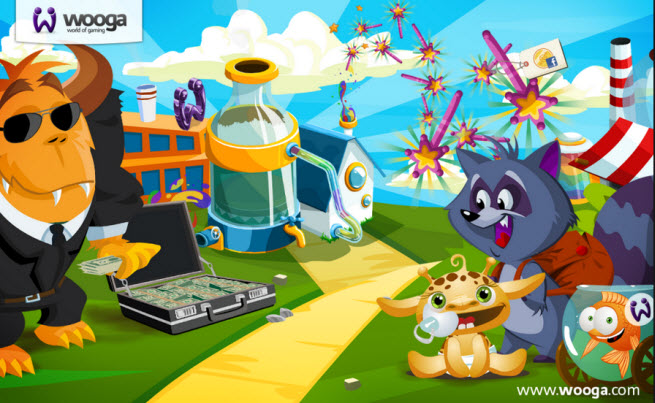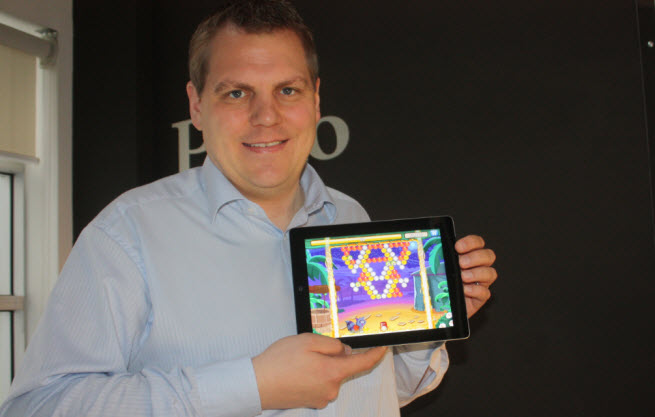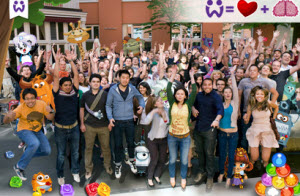GamesBeat: How large do your teams get with each game?
Begemann: A team starts with just two or three people making a prototype. At launch it’s between 10 and 15. Post-launch, for a successful game, it can be 15 or 20 people. That’s a typical size. We have some games that are online, but we don’t have a live team working on them. Other games, like Monster World or Diamond Dash, have teams constantly working to improve them every week.
GamesBeat: Have you considered something like the 80-person team at Machine Zone, where they worked for 18 months to come up with Game of War?
Begemann: We were moving in a direction where teams were getting larger. Pearl’s Peril, our hidden-object game, that became about 30 people at some point. That was becoming too big. The communication overhead was quite big. It was not agile enough or innovative enough. So we prefer to keep the teams smaller.
Timeline-wise, from prototype to launch, it’s still a year. It can be more than that, up to 18 months. But I think the teams should be small. If we need to add lots of graphics, sometimes we’ll work with external partners to deliver more content. But we try to keep the core team inside the company to 15 people or less.
GamesBeat: Do you consider your transition to mobile successful, then?
Begemann: Very much for us. Two years ago our mobile revenue was zero. It was all Facebook. Our Facebook business is still going well, but mobile is growing so fast that it’s now more than half of our revenue. With the Android launch of Jelly Splash next week, we may be ready to announce a new benchmark in terms of mobile share toward the end of the year.
GamesBeat: You guys had an HTML5 game that you canceled. Do you still feel the same way about HTML5?
Begemann: Yes. The challenge on HTML5, it’s two things. One is on a technological level. Users are demanding an excellent experience in terms of response time and how smooth everything feels. In many cases they expect the game to work offline. That’s possible with HTML5, but more difficult. Getting that cross-platform is tough.
The second thing is that the behavior of users is different. On the PC, most people only have one app running. That’s their browser. They’re happy with switching from one website to another and entering websites. On mobile, a number of users rarely open their browser. They’re hopping from one app to another. What people want is an icon on their device, and they’ve learned that how you get that icon on your device is through the App Store or Google Play. The learned user experience is very much about apps. Using HTML5 in the browser goes against what users have learned. It makes adoption much harder.
GamesBeat: How do you look at the rest of the mobile landscape and whether all these mobile game studios are healthy or not? Is everyone collectively benefiting from a larger market?
Begemann: The whole market is in a big transition. It’s even broader than just inside mobile. If you look at console and browser, everything is changing. Looking at mobile, we’ve run some numbers and done some estimations. About 40,000 new games launch every year on iOS and about the same number on Google Play. Not quite a thousand a week. By our definition of a hit, I’m not completely sure on this, but it seems like about .2 percent of games cross that threshold. No more.
Some companies are benefiting a lot and are extremely successful. Many others struggle to earn their development costs back. From what I hear, most companies don’t make their money back. But a few are super successful. This leads, I think, to consolidation. That will happen over the next few years.
That’s why we’ve put so much focus this year on creating this development funnel where we repeatedly produce hits. About 15 prototypes a year go into production. Five launch. Two to three become hits. This year, that’s been Pearl’s Peril and Jelly Splash so far, and the year’s not over. I’m optimistic for what’s coming next.
GamesBeat: Have you thought about doing things like some of your competitors and going into third-party publishing?
Begemann: If the right game comes along, we would publish it. Our core focus is still being a developer and creating games, but we’re open to that. We’re talking to independent developers about it.
GamesBeat: But you’re not necessarily seeding those kinds of companies.
Begemann: No. We’re not an investor. If an independent developer is there and they say they want the marketing power and the distribution power and the reporting systems and the ability to localize that we have, then we can help them with that. We wouldn’t finance development.
GamesBeat: Are we on the cusp of globally appealing games? Angry Birds kind of ran out of gas in that respect. Do you think that you actually need to design a global game?
Begemann: It’s a very interesting question. We have seen games like Diamond Dash become successful all over the world, except in Japan, Korea, and China. And we’ve seen a lot of games that are only successful in east Asia. There’s still this chasm, if you want to call it. Japan, Korea, and China work differently. That’s something we’re watching very carefully.
We design our games more for the rest of the world. We don’t design our games specifically with Korea or Japan in mind. But we look at everything. We have a very international company. More than 40 nationalities work for Wooga in the same office in Berlin. Every team is very international too. So, they don’t create a game that’s just German or American or whatever. We create games that fit a global taste.
A few years back, people said that things like free-to-play would only work in Asia, and they’d never work in the West. But they’ve made the transition. That will be something to watch in the next few years. Will these markets come together, or will they still stay separate?
GamesBeat: What do you think of mobile-messaging networks like Kakao and Line and WeChat? Do you think they’ll catch on elsewhere in the world?
Begemann: We watch those platforms very closely. They’re extremely interesting. We may have something to announce on that. In terms of the messaging platforms, they’re separated by country. Line dominates Japan. You have WeChat in China and Kakao in Korea. To a smaller degree, What’s App is strong in Europe. It’s replaced text messaging for many people.
These platforms can be an additional distribution channel. It’ll be interesting to see if they unify or remain separated from market to market. We’ll see how they compete against each other. To us, when it’s right, it could be an interesting additional distribution platform.
VentureBeat's mission is to be a digital town square for technical decision-makers to gain knowledge about transformative enterprise technology and transact. Learn More





